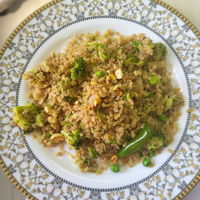Honey- The natural sweetener
- Food Trove
- 3023

“Life is the flower for which love is the honey”-Victor Hugo
When you think about honey, you are reminded of Winnie the Pooh. Honey is a sweet viscous substance produced by the bees and other insects. It is the result of the hard work done by a swarm of bees, which includes miles of travel time before it actually reaches the hives, It is channelised through a lot of processes, following which it is then collected by humans, to be later processed and filled in the beautiful bottles to finally make it to our homes.
Honey is not a nutritional power house, and it doesn’t contain vital vitamins, instead they are actually sweeter than sugar with 304 calories /100gms. Nevertheless, honey is liked by many of us as it is a natural sweetener.
•Honey is a natural antiseptic as well anti bacterial, and it helps in healing wounds and bruises.
•Honey can be used to soothe stomach ulcers and heal sore throats.
• The consumption of honey with cinnamon is good for diabetics as per new researches.
•Never give honey to kids below the age of one, as it may contain number of spores called clostrium botulinum which might cause botulism.They multiply in babies, causing a serious form of food poisoning known as infant botulism.
•Honey finds its mention in Greek mythology, Hinduism and Bible. It was considered important during the Jewish New year Rosh Hasanah.
•Honey is used as the best alternative for sugar, when it comes to baking and gives a nice sweet flavour to the cakes.
•Propolis along with beeswax is found in beehives which are anti bacterial and are good good for treating seasonal allergies.
•Recently it was found that 75 % honey bees across the world are affected by dangerous pesticides there by contaminating the quality of honey (as on October 9, 2017).
•Percentage of neonicotinoids found in honey is on the rise which might be a threat to the bee colonies as well as affecting the quality of honey (as on October 9, 2017).












0 Comments